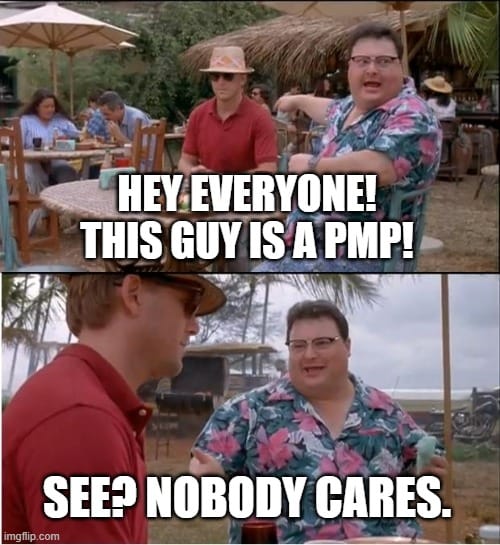Is Project Manager Certification Worth It?
Summary
- Certification has benefits, but the benefits are more subtle than new jobs and more money.
- Hiring managers at tech companies are looking for candidates who’ve shown they can perform in similar roles; university degrees and certification show you can learn and pass tests… not that you have been successful at the kind of job they’re hiring for.
- What certifications do provide is common frameworks and terminology, and access to professional communities.
- Pursue certifications if they’re a fit for your personal growth, not because of a hope they’ll accelerate your career or earnings.
Hot Take
Earning a project management certification (e.g. PMP, PRINCE2) takes time and hard work. While there is value in these certifications, in my experience in the tech world that value usually doesn’t include helping you get a job, gaining higher pay, prestige, or even making you a better project manager. That doesn’t mean certification isn’t worthwhile… but I don’t think it’s worthwhile for the reasons people often assume.

What Certification Is
I’ve often been asked whether professional certification (such as PMP or PRINCE2) is useful for project managers. Will it help you get hired, increase your skills, advance your career, or earn you more money? Well, certification can be useful in some ways, but not necessarily in the ways you might think.
Certification involves a combination of training, testing, and verification of work as a project manager. PMI’s “Project Management Body of Knowledge” Guide can give you a sense of the training and testing involved. The process can take months (plus some cash for fees).
What Hiring Managers Want
After more than a dozen years as a member of Hiring Committees at Google, I can say that what matters to most hiring managers at big tech companies is not whether a job candidate can do a Gantt chart or Earned Value diagram, but whether they can get their team organized, keep everyone informed, persuade people, collaborate across orgs, and so on.
Bottom line, hiring managers want someone they’re confident can do the job they’re hiring for. Resumes, college diplomas, job titles, and… certifications, which show you can study and succeed at tests, don’t really move the needle for them when it comes to confidence.
What does move the needle? Demonstrated delivery of results in a similar job: that’s what the best interviews focus on: what situations have you actually been in, what was difficult about them, and how did you work your way through them? Having a theoretical understanding of how to deal with hypothetical situations, or being able to work out a good approach from first principles are great for entry-level roles, but beyond that hiring managers want to understand how you’ve actually solved problems like the ones they have. They want to hear about how you’ve organized work with constant changes of direction; how you found a creative way to trade-off scope, time, and cost in a project; how you handled a key stakeholder whose goals differed from your team; or how you got things done even though you didn’t have formal authority. Having a certificate (or a degree, or an impressive resume) doesn’t reveal those things.
What Certification Can Do For You
While getting a PMP might not “punch your ticket” for advancement in tech, it nevertheless can be beneficial in some situations:
- Common frameworks and vocabulary. Certification can ground you in a common and standardized set of words to use for project management concepts, which can make you more effective when interacting with other project managers. You could certainly achieve the same thing by reading a good book on project management… but honestly, what are the chances you’re going to study a book like that on your own? For folks that aren’t into heavy reading for work, a certification program might work better.
- PMI and other certifying groups provide you with a professional community outside your job, with discussion groups, conferences, and more.
- Certification can give you a better understanding of a baseline of practice and a view of the variation in practice between companies. This awareness can spark creativity on your part, suggesting different ways to do things that folks at your own company might not have considered.
While hiring managers in tech don’t especially look for certification, that’s not true everywhere: the State of Florida, for example, treats the practice of project management like the practice of medicine (and hairdressing) by mandating PMP certification for project managers working on certain government projects, including in IT. Also, outside of tech it’s not uncommon to see job ads that list certification as a desired qualification.
The message here is that certification has benefits, but if you choose to pursue certification, it should be because it’s something you want for yourself, not something that will get you a better job. It’s a lot like deciding whether you should pursue an advanced degree: the degree itself likely won’t make a difference to your employer, but it might give you insights and connections that enable you to deliver results you wouldn’t have otherwise—and that would be useful to your employer!
How You Can Bring Order From Chaos, Today
Here are some things you can do now to apply these ideas:
- Talk to friends who are certified to understand how they see certification fit into their own career journey.
- Talk to your manager to explore how certification is regarded in your company and its peers.
Want to Learn More?
- PMI’s Guide to the PMBOK (Project Management Body of Knowledge) is a (long) summary of the whole field of program management. It's more of a reference book than a text book, so have your favorite caffeinated beverage on hand!
- Project Management: A Systems Approach to Planning, Scheduling, and Controlling, by Harold Kerzner. If you’d like to learn more about the professional discipline of project management, with or without certification, Kerzner’s “systems approach” makes this is my favorite book on the subject (⚠️caution: it’s ~850 pages…).
What Do You Think?
I'd love to hear about your experiences with project management certification! If you're a paid supporter of this newsletter (hint, hint!) you can add comments below.
FTC Notice: Some of the links on this page are “affiliate” links, meaning that if you click through and buy the item I may receive a small commission, at no extra cost to you.



